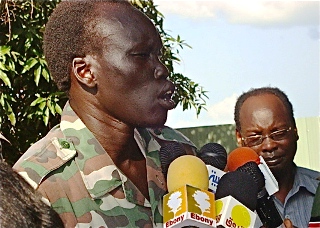S. Sudan labels rebel leader Yau Yau a terrorist
October 29, 2013 (BOR) – South Sudan’s ministry of foreign affairs has labelled Jonglei-based rebel leader David Yau Yau a terrorist and requested that the international community charge him for war crimes.

“South Sudan therefore calls on the international community to live up to its obligations and declare David Yau Yau as [a] war criminal”, Makol said.
However, in a separate interview, the country’s foreign minister, Barnaba Marial Benjamin, said his government remains committed to the peace process in line with a presidential amnesty granted to the rebels, in comments that sharply contradicted with statements made by his ministry’s spokesperson.
“No, that is not the stand of the government. The peace talks with Yau Yau will go [on] as planned. The presidential amnesty is still holding, we have not labelled him [Yau Yau] as a terrorist”, Marial told Sudan Tribune by phone from the Rwandan capital, Kigali.
Yau Yau’s forces have been blamed for numerous attacks on civilians since he first rebelled against the government after losing his bid to become a Jonglei state MP in April 2010. He accused the government of rigging the elections, later joining forces with the late George Athor Deng who began a rebellion in Jonglei’s Pigi county in the same year.
The rebel leader, who studied to be a clergyman earlier in his career, returned to Juba a year later and was promoted to the rank of major-general despite having no previous military experience.
However, he soon become dissatisfied with his agreement with the Juba government and travelled to Nairobi on what was supposed to be a trip for medical treatment, but never returned.
South Sudan alleges he went to Khartoum to arrange for the latter’s support for a fresh insurrection among his own ethnic group, the Murle.
It is believed that he recruited young men from the Nanaam and Kongkong areas in Pibor in August 2012.
Since beginning his rebellion in Jonglei, hundreds of people in the various places his groups targeted have either been killed, injured or displaced.
Human rights groups have reported that the South Sudanese government’s response to Yau Yau’s rebellion and the cycle of cattle raiding between the Murle and other tribes has targeted Murle civilians.
Despite originally denying any wrong-doing earlier this month, the South Sudanese army (SPLA) sentenced five soldiers to the death penalty after they were convicted by a military court of murdering civilians in Jonglei.
Two soldiers also face prison sentences after being found guilty of rape, while 24 were charged with misconduct due to frequent drinking.
Meanwhile, Yau Yau’s rebels were recently accused by South Sudanese officials and the commissioner of Twic East county of carrying out an attack that left 80 people dead and 88 others injured.
About 24 children were believed to have been abducted in the same attack and close to 25,000 heads of cattle looted from the two villages of Pageer and Maar on 20 October.
Yau Yau has denied his group was responsible for the attack.
In February 2012, five UN soldiers and seven other staff were killed in Jonglei state’s Gumuruk payam (district) while travelling in a UN convoy from Pibor to the capital, Bor. South Sudan’s army in Pibor blamed the rebels for the attack but Yau Yau has refuted the allegation.
(ST)
